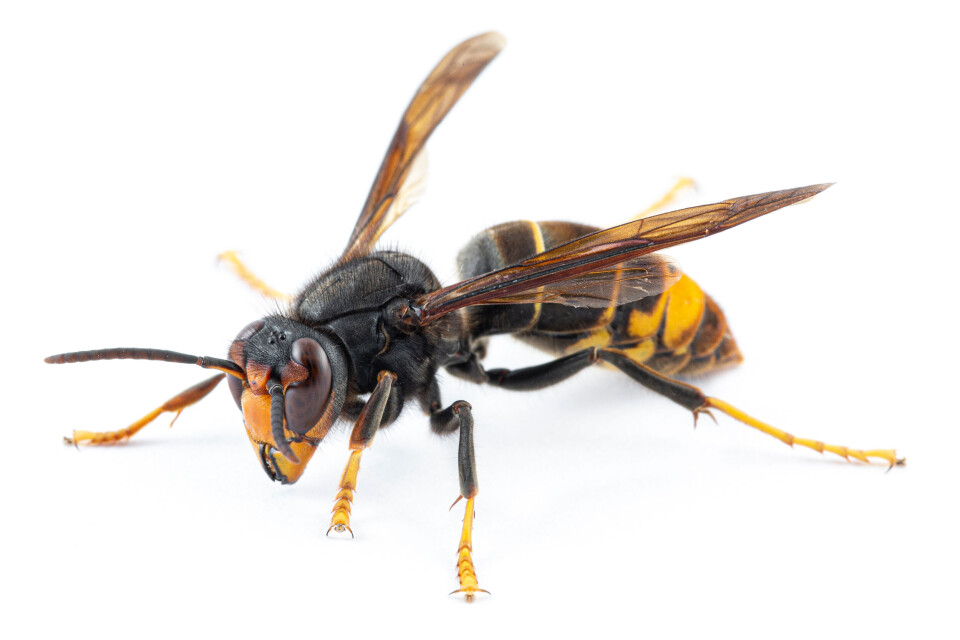-
Travellers risk extra costs under new Eurotunnel ticket rule
Some fare options are less flexible and less forgiving of lateness
-
May will be difficult month for train travel in France, warns minister
Two major train unions are threatening to strike and are ‘not willing to negotiate’, he says
-
Larousse dictionary adds 150 new French words - which ones do you know?
The new words come from trends in sport, nature, leisure, food, medicine, and the rest of the French-speaking world
Asian hornets are still prolific in France due to mild autumn
The invasive insects have remained active later in the year, say experts

Asian hornets are still present and spreading in France due to a mild autumn with active nests suspected to be in all departments.
Asian hornets (Latin genus and species name Vespa velutina) - which can be aggressive and dangerous to humans if they feel threatened - arrived in France in 2004, and have spread across the country, especially as temperatures have risen. This year the problem is especially apparent due to continuing mild temperatures.
The hornets are normally more active during the summer and rare in autumn but this year they are still active.
Beekeeper Rémi Martin told FranceInfo: “It was milder in October. Usually, at the end of September, the hornets disappear because of the cold but this year, the climate has enabled them to continue being predators.”
The hornets can be aggressive when they feel their nest is threatened and are harmful to bees as they raid hives and eat them.
Read more: French beekeepers fighting killer Asian hornet
Aggressive hornets
In August this year, two cyclists were rushed to hospital in a critical condition after having been stung more than 50 times as they disturbed a nest while out on a ride. The duo was thought to have been stung by Asian hornets but it later emerged that the insects were European hornets.
Aged 51 and 72, the men were stung 50 times each and were admitted to intensive care. While all hornets can be aggressive, such an attack is rare. It is thought that the cyclists may have accidentally dislodged or otherwise touched the nest.
Read more: ‘The hornet attack on cyclists in central France was not random’
At the time, Bertrand Dufour, manager of a Loire company with 10 years of specialist experience in destroying hornet and wasp nests, said: “These insects only react when they feel in danger. They feel in danger if you try to go after them yourself, or if you are near the nest.
“For example, if you put your foot next to a nest without seeing it, it makes vibrations and then they come out to sting you. Or maybe a nest fell due to wind in the forest, and these cyclists were nearby and had bad luck."
Pierrick Marant, a beekeeper in the region, told regional newspaper Le Progrès: “Hornets, like bees, do not usually attack humans. They will do so to defend their nest and when they feel threatened.
“A smell can also disturb them. An attack generally occurs when a person or any other intruder approaches within a radius of two to three metres of the nest.”
In 2012, a 54-year-old married father-of-three died after being stung by three Asian hornets, after he accidentally disturbed a nest while trimming a hedge in his garden. He died of an allergic reaction and shock before emergency services could reach him.
In 2020, a 70-year-old farmer died after accidentally disturbing a hornets’ nest while working in a field on his tractor. He also suffered anaphylactic shock.
His death prompted emergency services to warn the public to be alert to the possibility that nests may be quite low and close to paths.
Read more: French hornet attack: how to spot the insects and treat the stings
2030 plan to combat hornet spread
In March 2022, France announced an eight-year plan to combat Asian hornets, as well as the spread of other invasive insect species.
Biodiversity Minister Bérangère Abba presented a plan for 2022-2030, including a €1.5million investment for the first year.
Read more: France to take action against Asian hornets and other invasive insects
The plan is set to focus on “prevention and early action” against the insects, she said, including raising awareness of invasive species, and improving best practices on how to prevent the insects from spreading.
This includes increasing checks on incoming goods, as well as raising awareness among the population on how to prevent and fight the insects.
It comes after the department of the Manche financed a new €95,000 research programme against hornets in 2020. It helped scientists to start testing a new kind of trap, using naturally-produced pheromones to repel and attract the insects as needed.
A researcher said: “The only way to be effective against the Asian hornet is to speak to it. We have to speak in its own language, to tell it to go away, to attract it to a trap.”
Related articles
French scientists fight Asian hornet ‘in own language’
War on wasps and hornets declared in the Dordogne
























